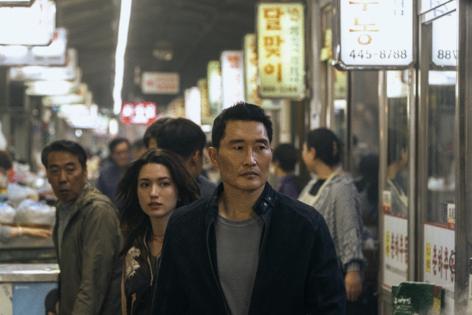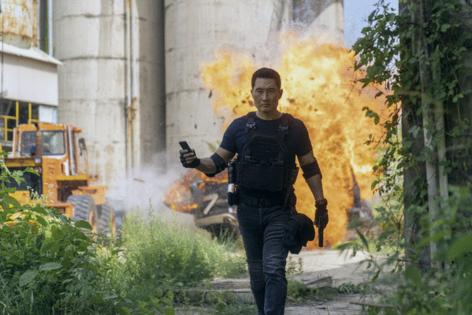Review: South Korea-set 'Butterfly' packages family melodrama as an action-packed thriller
Published in Entertainment News
Thrillers, thrillers, thrillers, so many thrillers. Every third show I review seems to be one, and even if that math is not perfectly correct, the seeming is real enough. Sometimes they are full of interesting characters and ideas, sometimes full of posturing stereotypes with nothing to say, sometimes mostly smoke and noise, and often just take you where you've been before — it's only how they're dressed that sets them apart.
What most obviously sets "Butterfly," premiering Wednesday on Prime Video, is that it takes place in South Korea, with Korean and Korean American heroes and villains. Adapted by Ken Woodruff and Steph Cha from a graphic novel by Arash Amel and Marguerite Bennett (in which the characters are not Korean, and the setting not Korea) it stars Daniel Dae Kim as former CIA agent David Jung — believed dead, but not dead.
Information is developed and doled out across its six episodes, but notwithstanding the twists and turns, it's a straightforward scenario. David, who co-founded a private sector security business after leaving the agency, disappeared from view nine years earlier; thought to have been killed in the course of an operation, he's been hiding in South Korea in plain sight with a second wife (Kim Tae-hee). David's late first wife was the mother of his daughter, Rebecca (Reina Hardesty), 23; in his absence she was raised by and is now working as a top-flight assassin for Juno (Piper Perabo), David's former partner in Caddis Private Intelligence — which for the convenience of the production has opened a sparkly new headquarters in Seoul.
Before his apparent demise, David and Juno had been heading down separate paths regarding their company — he more high-minded, she more mercenary. "The only enemy I have is peace," she'll say, managing to maintain an air of well-connected respectability while doing the dirty work. Juno also has a son, Oliver (Louis Landau), whom she had packed off as a youngster to live with his father in England, where he acquired an accent and the patina of one of Bertie Wooster's less assertive friends. Now he's working as an aide to his mother in a less than essential capacity and seeking her approval.
Although the spy stuff accounts for the running and shooting, the car chases (which Rebecca seems to especially enjoy), the martial arts dust-ups and near constant threat of death, it's also beside the point. "Butterfly" is a sort of an action soap, an extended family melodrama with guns. The political story, should you care to track it — not that you really need to — matters less than the personal one, set in motion by David's reappearance and his desire to reconnect with and save Rebecca, which puts him into conflict with Juno. (And with Rebecca, who is not convinced she needs saving.)
She is naturally angry with him for leaving her, but before long she is calling him "Dad" and engaging in spiky banter. There will be tears — and punches.
As in less explicitly violent variations on the theme, children resent their parents' choices, and parents respond that everything they've done, good or ill, is to keep the children safe. (Rebecca is being asked to choose between her father and her surrogate mother as if they were divorcing spouses.) Surely no other spy drama has contained so many declarations of love, pleas for love, expressions of guilt or apologies.
For all its emotionality, the dialogue can be a little flat, a little stiff, a little cornball. (David: "You hurt my family and I will destroy everything you care about." Juno: "While you played dead, I built an empire. You can't touch me.") The tonal transitions, from creepy to weepy and back again, might cause you some aesthetic whiplash. Gun (Kim Ji-hoon), a fine-featured, long-haired killer engaged by Juno and who will play for Team Evil against Team Less Evil in the inevitable climactic showdown, is the sort of part you will see even more of once AI kills all the screenwriters. Minor roles — assorted friends, relatives and workers — tend to be more lifelike for not having to carry the weight of the melodrama and light up the proceedings here and there.
The action is well-staged and executed, and the series as a whole looks fantastic; not one of the show's many locations, whether upscale, downscale, urban, rural or industrial, is wasted, but is captured with a crispness that frames the drama wonderfully. Apart from the fussing and fighting, there's an appealing travel element to the series. Local cuisine — preparing it, eating it, admiring it — plays a part as an expression of love and love of country. (We know that Juno is a broken person by the meagerness of her lunch.) "Butterfly" may be the place you learn about budae-jjigae, or "Army base stew."
The show flies on toward an ending that keeps ending and finally isn't an ending at all. (You will sense it … not coming, before it doesn't come.) Obviously this is to get you back for a second season, and while I understand that, I will say that this particular non-ending felt a little mean to me, a little unfair. Life isn't fair, you may say, but television has the opportunity to be better than that.
Still, I suppose I'll check in when "Butterfly" comes back — and between the thriller effect and America's love affair with Korean culture, I expect it will — just to find out what's at the bottom of that cliffhanger and how angry I should actually be about it. The series, which is no worse and somewhat better than "perfectly fine," certainly has its points, Kim and Hardesty not the least among them. Would I prefer to watch them in an episodic procedural as father-daughter investigators solving crimes from week to week, or doing spy stuff, or cooking together? Yes, I would like that very much.
This story originally appeared in Los Angeles Times.
©2025 Los Angeles Times. Visit latimes.com. Distributed by Tribune Content Agency, LLC.
















Comments